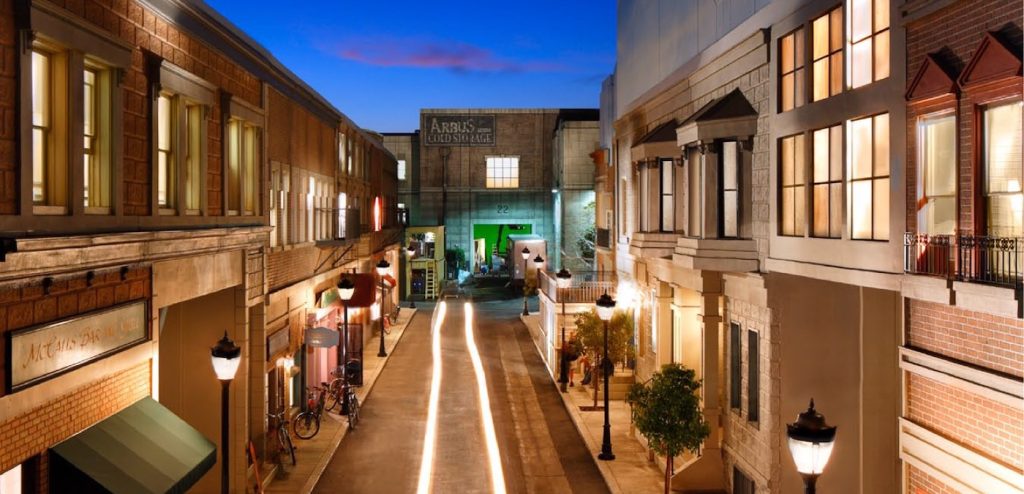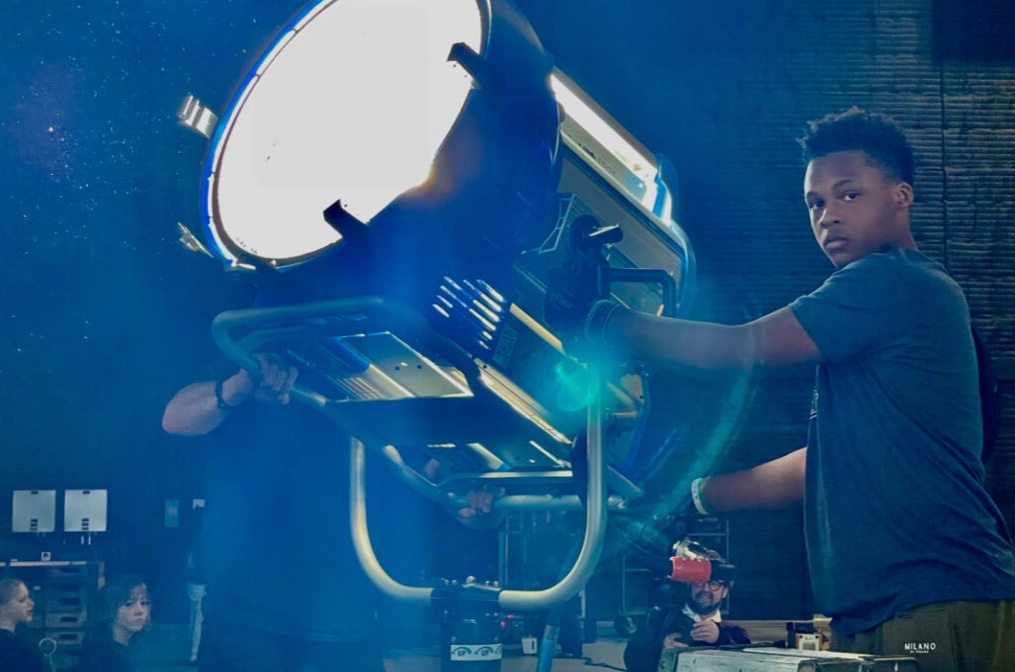The Studio Giant You’ve Never Heard Of: How MBS Group Powers James Cameron and Some of Hollywood’s Biggest Productions
You might not recognize the name The MBS Group right away, but if you ever wandered through legendary studio lots like Radford Studio Center, Culver Studios, Raleigh Studios, or Symmetry Park Studios London, you’ve stepped onto one of the nearly 50 studio campuses they operate globally. The company is the world’s largest studio operator, running top-tier campuses in iconic entertainment hubs like Los Angeles, New York, and London. But they’re not just renting out space — they’re the behind-the-scenes powerhouse designing studios, planning productions, and delivering the technical backbone of the entertainment industry.
At its core, MBS Group is a creative industry problem solver, building a complete ecosystem for content creators. Over the years, they’ve grown into a full-service juggernaut, tackling every phase of the production pipeline. For instance, MBS Equipment Company operates an equipment rental division, supplying lighting, grip, and more to over 650 soundstages worldwide. MBS Innovations (MBSi) serves as their think tank, inventing cutting-edge technology and enhancing production workflows. Studio Art & Technology is their custom manufacturing arm, and ISS Props has the goods to dress any set. But the crown jewel? That would be The MBS Media Campus in Manhattan Beach, a cutting-edge lot featuring over a dozen soundstages and a full-on New York backlot. It’s not just impressive; it is home to James Cameron’s Lightstorm Studios.
As a member of the California Production Coalition, we reached out to Jason Hariton, Chief Studio and Real Estate Officer of The MBS Group, to inquire about the business helping power James Cameron’s Avatar franchise, how the streaming age has impacted the way studios operate, the time Netflix’s Ted Sarandos challenged him to envision the future, and more.
Do you have a defining moment in your career that helped shape your leadership style or business philosophy?
While it’s tough to pick a singular moment that helped shape my philosophy, one story immediately comes to mind. Just a couple of days in at Netflix, I sat down for my first formal meeting with Ted Sarandos. I asked what he needed from me in my new role leading global studio and production operations. I was then a department of one. Ted matter-of-factly explained that Netflix would soon be producing over 1,000 productions per year throughout the 190 countries that it serves, and he tasked me with ensuring that we had the necessary infrastructure, equipment, and crew required to execute that mission. I remember thinking it was pure insanity—1,000 productions? Impossible. But I could see that he believed it, and that was inspiring. He calmly asked me to come back with a plan. I did just that – I came back with a phased multiyear plan to create the largest infrastructure footprint in the content industry. To establish new resources where they’d never existed, and to ring-fence the rest. I wrote it up in a Netflix-style memo and sent it out for his review.
What was Ted’s reaction?
When I sat down with him, I could tell that he’d read the memo thoroughly. He asked educated questions, and I did my best to answer. I figured this was all just a market research exercise. As the meeting ended, he told me to go for it. To make it happen. “Which part?” I asked. I wondered which of the many recommended elements of Phase 1 he was greenlighting. “All of it,” he said, as if surprised I didn’t already know. My department of one would soon be staffed with hundreds, and the initial plan would be accomplished within the first 24 months. Ted’s support never wavered. And, he was right: Within a couple of years, we were producing more than 1,000 productions per year.
What is the long-term vision for The MBS Group?
It is difficult to have a crystal ball when we are in the midst of such interesting times for the industry, but the hope is to see MBS grow alongside existing and new content studio clients. To stay nimble, to innovate, and to adapt as they adapt. In practical terms, I see MBS expanding into new regions, servicing both English and local language content production at scale.
How has the evolving landscape of television and streaming content changed the way studios’ facilities want to streamline operations or support productions?
The evolution of streaming content has turned what was once a disparate mix of local and regional content producers into a truly global and interconnected industry. Before streamers, there was local-for-local content and then we had global English language content. Those lines are now blurred and eroding rapidly. We see more local-for-global content that’s elevating new stories and voices, with advancements in dubbing and subtitling that remove language barriers, such as shows like Netflix’s La Casa De Papel (aka Money Heist) or Squid Game.
These successes are leading to more regional and localized content spending, including higher budgets, increased title volume, and better production values, while proving that local stories can and do play well to a worldwide audience. That, in turn, drives demand for larger and more advanced regional infrastructure and equipment. And, reciprocally, we are seeing more tentpole global-for-local content that incorporates culturally diverse talent, stories, and locations that not only appeal to the mass market but also speak directly to local audiences.
What trends will define studio facilities in the next 5 years?
Over the next five years, we anticipate that technology, largely driven by advances in artificial intelligence, will precipitate a significant leap forward in production methodologies. While the unknown can be intimidating and may bring challenges, some initial indications are exciting. As more work can now be done in-camera – take virtual production as an example – the increasingly large LED volume screens require larger, taller soundstages, with an abundance of electrical power and robust roof structures to hang screens.
“Brain bars” need to be developed at facilities to handle the computing required to power tomorrow’s productions. As larger and more technologically advanced set pieces replace traditional practical locations, there’s a need for more advanced 3D printing, automation, and tools for world creation. As these elements enter the soundstage, we require larger doors, advanced MEP systems, and new lighting solutions that communicate directly with the camera’s sensors in real-time.
MBS MENA Limited is a newly formed division of The MBS Group with an operating presence in the Middle East and North Africa (MENA) region. It manages and operates AIUIa Studios in Saudi Arabia. With films like Kandahar and F1 being shot in areas of Saudi Arabia, how has the region influenced the MBS Group’s footprint in the country?
To quote Abeer M. AlAkel, CEO of The Royal Commission for AlUla: “…In just five years the RCU has welcomed more than 440 international, regional, and local productions, including 85 in the past year alone. And behind each of these productions is a growing community of Saudi creatives, many from AlUla itself, who are finding their voice and their place in this global industry. Through hands-on training, real-world experience, and mentorship, we’re opening new pathways for the next generation of storytellers.” We had looked at many exciting MENA opportunities over the past few years, but none presented the right fit for our first regional footprint; not until we learned about AlUla and the vision of the RCU.
How is The MBS Group adapting to the rise of virtual production and other emerging technologies?
MBS has leaned in to virtual production (VP) and LED technology. Most recently, we acquired the UK/Europe’s foremost provider of virtual production solutions, VSS, also known as Video Screen Service. In line with our solutions-centered ethos, we are not exclusive to any one software or hardware solution. We’ve provided unique VP solutions for tentpole projects at Warner Bros. Leavesden, Amazon’s Fallout in NYC, Apple TV’s Masters of the Air in London, Warner Bros./Legendary’s Dune in Budapest, among others. The MBS Media Campus in Manhattan Beach is also home to Avatar, as well as The Mandalorian and its spin-offs.
The MBS Media Campus has been around since 1999. What would you say makes it different from the other major studios?
The MBS Media Campus in Manhattan Beach – our company’s namesake – is special in that it is relatively new infrastructure for the greater L.A. market. Massive state-of-the-art 25,000 sqft soundstages with 45’ clearance. Since 1999, the Media Campus’ design and specs have served as a model for many of the newer soundstages built around the world. The scale of the project has enabled it to serve as the home of James Cameron’s Lightstorm Studios and his Avatar franchise for the last decade.

MBS Equipment Company provides services to numerous studios worldwide. Let’s say a production is shooting in multiple locations, and plans to use MBS Equipment Services across different studios serviced by MBS. Is there an incentive or deal there for a production to make?
Absolutely. We have enterprise deals with many of the major content studios and production companies, and we incentivize productions to utilize our services on and off the lot, across multiple studio facilities and locations, and across various service lines, including lighting, VFX, props, armory, production planning, and more.

Before we let you go, how important was the passing of California’s Film & Tax Incentive Program 4.0?
It was incredibly important! Hollywood is hurting. The labor strikes and the fires have exacerbated a crisis that has been affecting friends and family for a long time. Unemployment for California’s motion picture workers is at a record high. It’s dire, with many people losing homes and being forced to find new careers – often out of state. This new legislation is critical. I was proud to help start the California Production Coalition, and I thank all those involved in this monumental effort, including the MPA. I pray we see some positive effects over the coming months.
This article is part of an ongoing series that raises awareness among businesses and individuals in the film and television community. The MBS Group is a member of the California Production Collation. You can find more about them here.
Featured image: On set of 20th Century Studios’ AVATAR 2. Photo by Mark Fellman. © 2021 20th Century Studios. All Rights Reserved.



